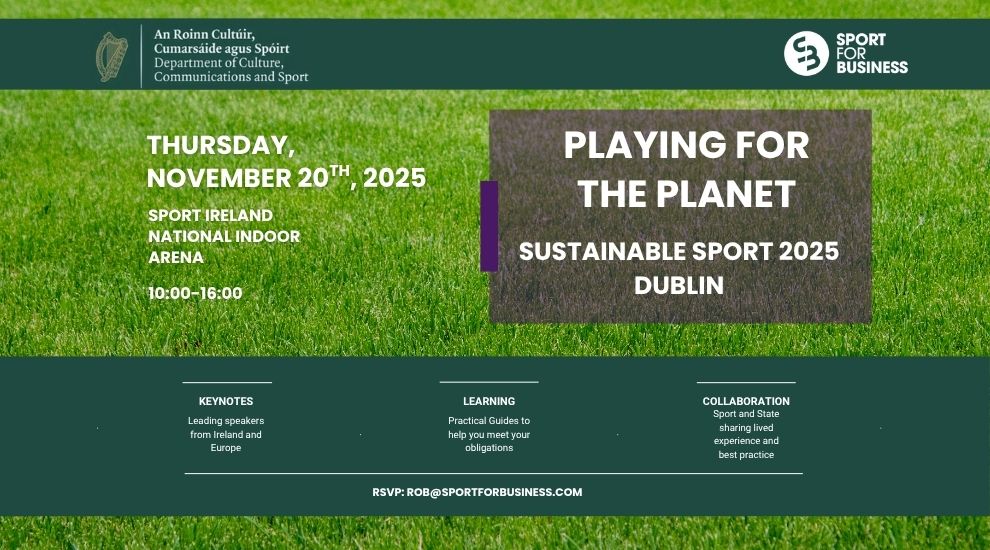UEFA EURO 2028 burst into life last night as landmarks across the UK and Ireland lit up to mark the official launch of what is set to become the biggest sporting event ever jointly staged by the five host nations.
In Dublin, the Samuel Beckett Bridge and the temporarily re-christened Dublin Arena, or Aviva Stadium, glowed brightly from 20:28, signalling Ireland’s central role in a tournament expected to capture the attention of the world.
Ireland will host seven matches, five group games, a Round of 16 tie and a Quarter-Final, bringing elite international football to the capital on a scale never seen before.
For Irish fans, already stirring with memories of the country’s appearances at EURO ’88, 2012, at a stretch, and 2016, the prospect of seeing the Boys in Green compete on home soil will ignite growing excitement.
With over three million match tickets to be made available, more than any EURO to date, the 2028 edition promises to be a festival of sport and culture from Cardiff to Glasgow, Dublin to Newcastle.
A major independent assessment underlines the scale of the opportunity. EURO 2028 is projected to deliver €449 million in socio-economic benefits for Ireland, and €4.1 billion across the UK and Ireland between 2028 and 2031. Those gains range from job creation and visitor spending to long-term legacy benefits for grassroots football. Ireland will invest up to €93 million in tournament delivery, including €6.2 million ringfenced for social impact and community programmes.
“Bringing UEFA EURO 2028 to Ireland is a fantastic opportunity to showcase the fair city of Dublin, our country and our football to the world,” said David Courell, FAI CEO.
“Our amazing fans are known for their passion and we look forward to providing them, as well as the hundreds of thousands of people who will visit Ireland, with the type of euphoric experience they will never forget as we aim to play our part in delivering the best EURO yet.”
In London, Minister for Culture, Communications and Sport Patrick O’Donovan echoed that message of ambition. “Ireland is ready to play its part in delivering a world-class tournament that will excite fans and energise communities across the country,” said O’Donovan, noting the State’s investment and the expected return across jobs, tourism and national pride. “EURO 2028 will be a game-changer for Irish sport, and a milestone in showing what Ireland can achieve on the global stage.”
Minister of State for Sport Charlie McConalogue highlighted the tournament’s long-term vision. “We are working with UEFA, the Football Associations and our Government Partners to ensure the tournament delivers a lasting legacy for football and encourages increased participation,” he said. Football, he added, remains “a powerful driver of positive social impact”.
That emphasis on legacy is built into the blueprint. EURO 2028 will feature the largest-ever Community Programme for a EURO finals, empowering local organisations across each host nation to deliver initiatives centred on inclusivity, volunteerism, diversity, sustainability and pride of place.
Hundreds of communities will join the celebration, using football’s global stage to promote positive behaviours and broaden participation in the game.
For Dublin, which will host all Ireland’s matches, the impact will be profound. Lord Mayor Ray McAdam said the city was “deeply honoured” to take its place on the European stage.
“The opportunity to host seven thrilling matches will bring world-class football to our doorstep, but more than that, it will leave a lasting legacy for our communities,” he said. “In 2028, Dublin will pulse with the spirit of the game, igniting a festival of football that reflects the passion, energy and unity that make our city unique.”
Organisers also unveiled the official match schedule. The tournament will open at the National Stadium of Wales in Cardiff on Friday 9 June and conclude with the Final at Wembley Stadium on Sunday 9 July. In all, 51 matches will be played over 31 days across nine stadia in eight host cities. Should they qualify automatically, each host nation will play their group-stage matches at home—meaning Ireland’s group ties would all take place at Dublin Arena.
Quarter-Finals are set for Dublin, Glasgow, Cardiff and London, with knockout games distributed to minimise travel demands for fans and teams. Kick-off times have been fixed at 14:00, 17:00 and 20:00 GMT, with full matchday details to follow after the tournament draw in 2027.
The venues span some of the most storied grounds in European football: Wembley Stadium (86,000), the National Stadium of Wales (73,000), Tottenham Hotspur Stadium (60,000), Manchester City Stadium (58,000), Hampden Park (51,000) and Dublin Arena (50,000), alongside new or redeveloped sites in Birmingham, Liverpool and Newcastle.
EURO 2028 is no longer a distant prospect, it is 940 daya away.And for Dublin, illuminated in green and gold, the journey towards a landmark summer of football has begun.
Image Credit: Sport for Business, Sportsfile
Further Reading for Sport for Business members:
Read our Sport for Business Coverage of Venues
SPORT FOR BUSINESS Upcoming Events
November 20th – Playing for the Planet – A new event focused on Sustainability in Sport with the Department of Culture, Communications and Sport
December 9th – Our 12th Annual Women in Sport Conference in partnership with Lidl.
January – The Sporting Year Ahead 2026 in partnership with Teneo.
Sport for Business Podcasts
MEMBERSHIP AND EVENT,
The FAI, Dublin City Council and and the Department of Culture, Communications and Sport, as well as all the leading sporting and business organisations in and around the world of sport, are among the 300+ members of the Sport for Business community.
This includes all of the leading sports and sponsors, as well as commercial and state agencies, individuals interested in our world, and an increasing number from beyond these shores taking a keen interest in Ireland.
Find out more about becoming a member today.
Or sign up for our twice-daily bulletins to get a flavour of the material we cover.
Sign up for our News Bulletins here.




























